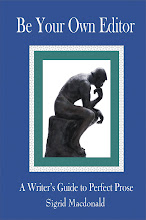Be Your Own Editor is a best-selling reference manual, rated #25 in the editing category on the Amazon Kindle Store and among the
Top 100 Paid Books on Kindle. It's an informal crash course on grammar and writing basics, written by a combination author and editor.
BYOE is meant as a guidebook for students and writers of all ages and stages, and incorporates humor as well as pop quizzes to help you learn in the least painful manner possible. The book is available on Amazon.com for $14.00. [
http://tinyurl.com/4qgef2j ] The Kindle version is only $3.99. [
http://tinyurl.com/4b8taao ]
The print book is $9.99 by ordering directly through me, not including shipping and handling, and the e-book is $3.99. If you're a student, let me know and I'll give you a 10% discount -- no questions asked.
Sigrid (sigridmac at rogers.com).
P. S. Check out my editing website, too, at http://sigridmacdonald.blogspot.com.
***
In today's high-tech world, we're all writers. Long gone are the days of
Mad Men when executives dictated letters to their secretaries. Nowadays, we're all connected 24/7 through our BlackBerrys, laptops, and notebooks. We're on e-mail, social networking sites, blogs, ad infinitum. If you write directly to an administrator or exec, you may very well hear back from that person, which would have been unheard of 20 years ago.
We write in order to sell on the Internet, to keep in touch with our children who are away at college, or to discuss issues on message boards. Professional writers develop manuscripts, write short stories, and devise query letters and book proposals. Students, much to their dismay, write essays on a deadline. The end result is that everyone is a writer.
Writing is like breathing, eating or sleeping in the sense that we all do it, but how well do we do it? In that respect, it's more like driving a car. Some people drive very well. They were taught the basics, took the responsibility seriously, studied the rules, and have driven for so many years that it's become second nature. Others learned by the seat of their pants. They accepted the recommendations that seemed most critical at the time (e.g., always stop at a red light!), and have been driving for so many years that they've forgotten some of the essentials. Ditto for English grammar and composition.
E-mail has become pretty relaxed. We understand that people are in a hurry and they deal with dozens, if not hundreds, of e-mails every day, so we cut them some slack. Not so of websites. Selling something? One or more typos on your site can seriously undermine your customers' faith in your intelligence, and consequently your product or service, even if both are stellar. And if you're submitting articles for publication or circulating your CV in the hope of obtaining a job, you had better have clean copy.
I've always been a writer, starting back in my teens. And I was fairly confident about my grammatical skills until I became a copy editor. Then I began to take grammar seriously and realized how much I didn't know. So, I went back to the beginning to teach myself the core concepts. It sounded like a real yawner and I wasn't excited about it at all. But, guess what? It turned out to be a lot of fun, because grammar has certain rules that will always remain the same, much like math.
Be Your Own Editor provides the crash course in writing basics that I wish I’d had at my disposal. It lists the most common mistakes I've encountered while editing 60 full-length fiction and nonfiction books. Run-on sentences, misuse of apostrophes, word confusion — should you use effect or affect? Loath or loathe? Like or as if? When should you use a colon and when should you use a semicolon? Are serial commas preferred to regular commas? Find out.
In addition to being a copy editor, I also act as a book coach. I help people create their stories, thus, I've devoted part of
Be Your Own Editor to discussing character development, credible dialogue, plot resolution, and how to write captivating background details for fiction. For nonfiction, I've discussed organization, content, clarity, the importance of up-to-date references and how to avoid overkill.
What about your spell-check? Why do you need a book on editing when you can just push F7? The spell-check is a phenomenal device; I couldn't live without it. However, it's far from perfect. And it doesn't work like a calculator. If you hit all the right buttons on a calculator, and ask it to perform the correct function, it's 100% accurate. Not so with your spell-check. The English language has too many homonyms, such as "they're, there and their." Any one of those words could be spelled correctly in your document but misused, and the spell-check may tell you it’s okay. If you say that you "through" the ball out the "widow," there is no way for your program to tell you that that's wrong. Typos are easy to make and after we've spent hours, if not months (or even years, in the case of books), pouring over the same material, sometimes our brain just takes a vacation and we can't spot our own mistakes. The spell-check won't help in this case but the recommendations in
Be Your Own Editor will.
Still afraid that you can't edit your own copy? That you'll miss something? I make a number of suggestions about how to find qualified people to review your final draft for very little money or for free.
All these and more are covered in 156 reader-friendly pages. This is not a stuffy English textbook. Far from it. I try to make you laugh from time to time, and have included three pop quizzes, so you can test your knowledge of punctuation or word usage at the end of certain chapters.
Anyone can benefit from the tools in this book because we're all writers. But professional writers in particular—writers who want to submit their material to agents and publishers—and students will find helpful tools to improve their current skills, along with recommendations about which books constitute the best reference material.
In fact, I'm so convinced that
Be Your Own Editor will be useful to you that
I'm offering a money-back guarantee. If you don't learn anything whatsoever in this book, write to me and I'll be happy to refund your purchase.
Meanwhile, happy writing.
Sigrid
Buy
Be Your Own Editor directly through me by hitting the Contact Me button or sending an e-mail to sigridmac at rogers.com. Or simplifiy your life and get it on PayPal.









